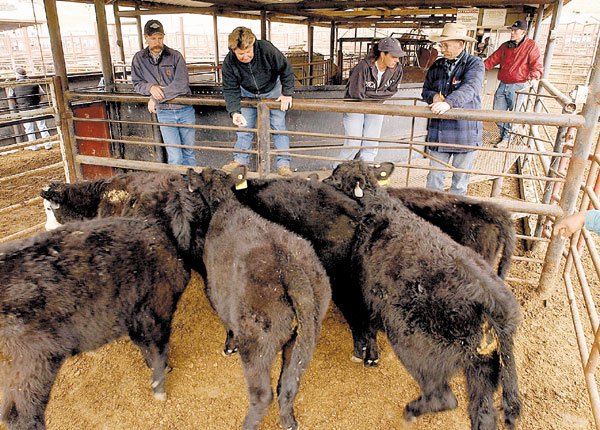With any luck, it will be headed to Japan from the 101 Livestock
Auction of Aromas
By Danielle Smith, Staff Writer
Aromas – As one of only five companies in the United States poised to receive federal certification allowing its beef to be shipped overseas, 101 Livestock Auction of Aromas stands to make a handsome profit from Japan, whose Cabinet has recently ended a two-year ban on beef imported from the U.S. and Canada.
Japan banned U.S. beef in December 2003, and Canadian beef in May 2004, after the discovery of cattle infected with Mad Cow Disease in both nations. The ban was repealed Monday after the Japanese Cabinet Office’s Food Safety commission determined that the risk of mad cow from American and Canadian beef was “extremely low.”
And, in early 2006, 101 Livestock Auction will become the sole company west of the Rocky Mountains certified under the USDA’s Quality System Assessment Program, which establishes a list of criteria cattle must meet in order to be shipped to Japan and other Pacific Rim nations.
“This will create a huge economic boon for us,” said Jim Warren, President of 101 Livestock Auction. “The demand for QSA cattle far exceeds supply, because it takes lots of work to get there.”
In order for a company to become QSA certified, its cattle must meet certain specifications. Each calf must be individually identified, and records have to be kept on the animal’s age, vaccination program and whether or not it has received implants of growth stimulating hormones. Based on this data, the animal is given a rating and its eligibility for shipment overseas is determined before the animal is sold.
The company must periodically conduct internal audits to ensure compliance and correct any non-conformities that may arise. Additionally, Japan will not accept beef from animals slaughtered after 20 months of age, and parts considered “high risk” for disease – such as the head and spinal cord – must be removed.
“This program is actually helping us take old problems and use them to our advantage,” Warren said. “In California, a lot of our calves are sold at about 17 months old, and sometimes are passed over for older, more mature animals. Now these calves can be sold at a premium so the beef can be shipped overseas. It’s amazing how things have turned around.”
While QSA requirements have left many companies scrambling to adopt new technology, the transition hasn’t been nearly so difficult for 101 Livestock.
Five years ago, the company introduced a system to individually identify and track each animal, on a hunch that such technology would one day become an industry standard.
“In the future, you will be able to tell exactly where your beef comes from and where it’s been,” said Warren. “And already big companies like McDonald’s are saying that if we’re willing to source verify our product, then they’re confidant enough to buy it.”
The idea behind source verification is that it promotes personal accountability, and should certain animals suffer an outbreak of disease, it can easily be traced to its source and dealt with.
While the system isn’t cheap – 101 Livestock Auction spent $50,000 in computer equipment over the past two years alone – Warren believes that the investment will pay off in the near future. The source identification technology adds between $5 and $12 to the price of the cattle, and when the company is granted QSA certification, Warren expects to see an additional increase of $5 or $7.
“We thought it was an important direction that the animal industry had to go in – it’s important to stand behind your product,” he said. “It’s a way of saying ‘Yes, my product is safe, I believe in it, and I’m willing to put my name on it.’ ”
Local ranchers John and Peggy Hodges have been ID tagging their cattle for two years now, but have not seriously considered going for QSA certification as of yet.
“I haven’t heard too much talk about it among local people,” Peggy Hodges said. “But I think it’s such a new program, that it will take some time for people to learn about it catch on. … But I think trade with Japan will be wonderful, and I can’t imagine why American beef wouldn’t be good enough for any country.”
While the QSA certification will effectively open eastern markets for 101 Livestock Auction, Warren says it is difficult to tell as of yet if the majority of the beef will wind up overseas. QSA requirements are so close to the criteria for beef to be certified as Natural by the USDA, Warren expects added attention from domestic markets, as well.
“We’re going to have the Japanese market, the Certified Natural market, and the local market all competing against each other,” he said. “And none of our competitors are able to do that at all. It’s a real exciting time.”
Danielle Smith can be reached (831) 637-5566, ext 320.














